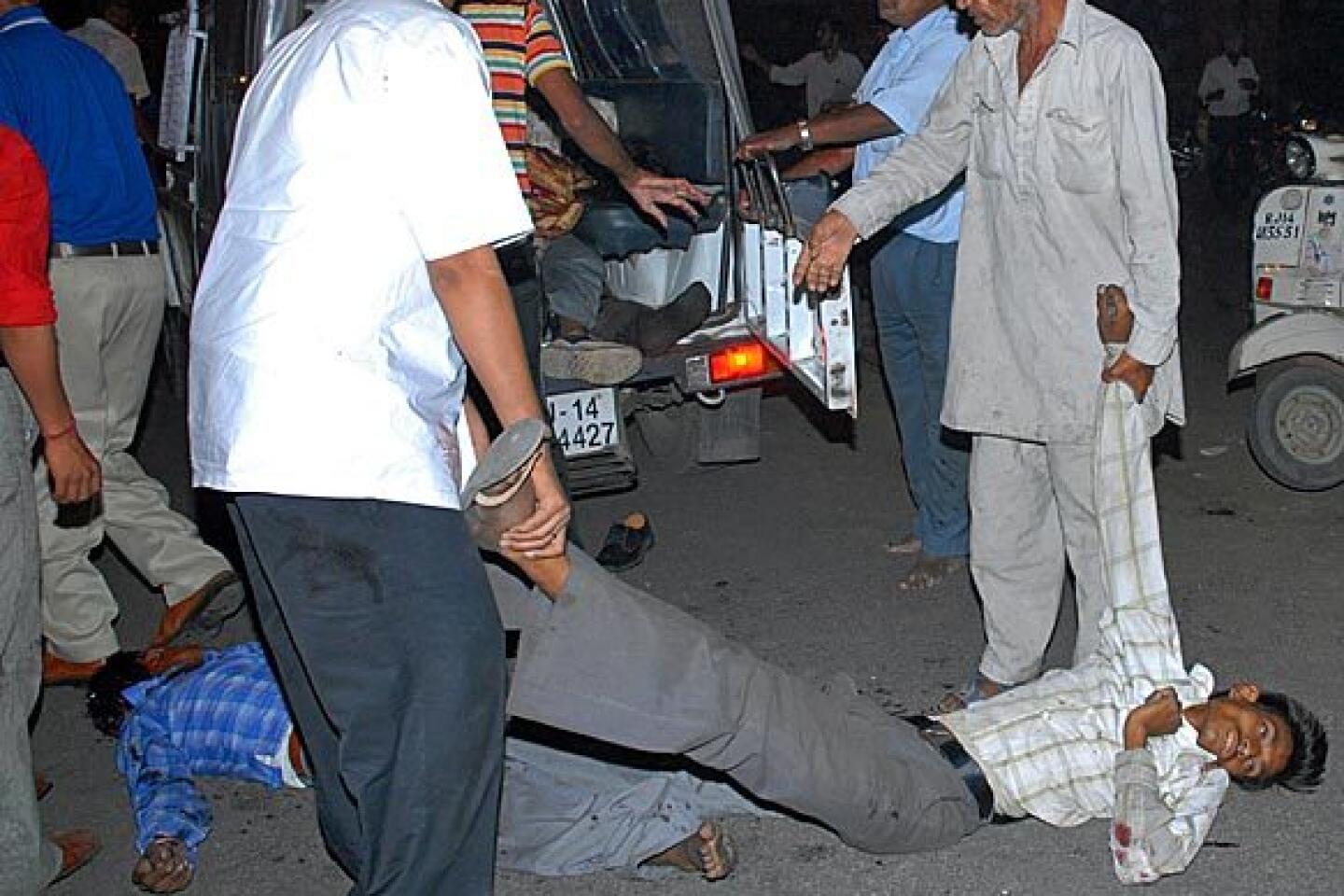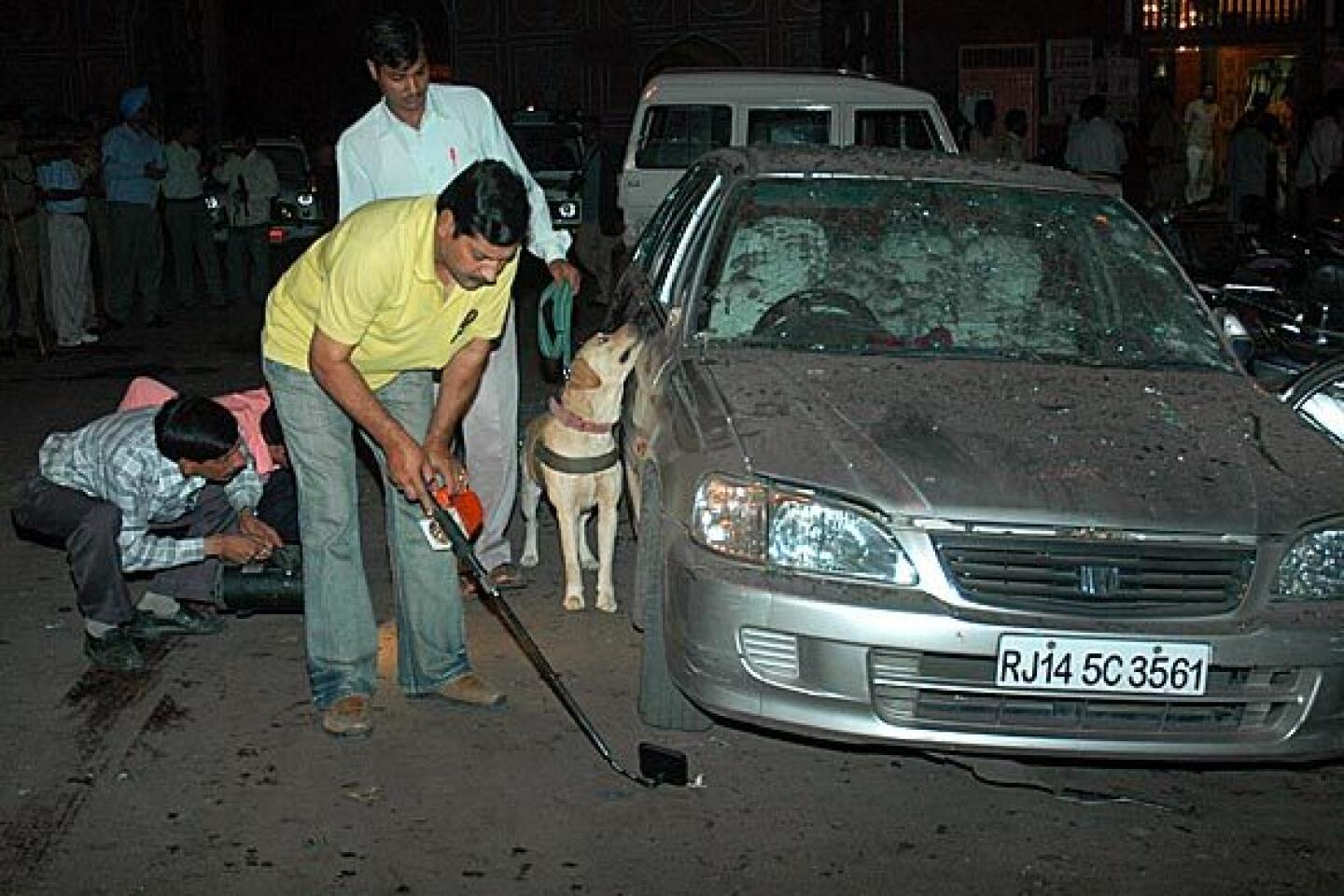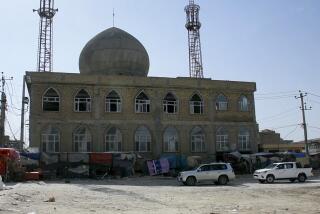Bombings kill at least 54 in Jaipur, India
- Share via
PUNE, INDIA — A series of bomb blasts killed at least 54 people Tuesday in one of India’s most popular tourist cities, injuring scores of others and triggering panic in busy market areas, authorities said.
Eight explosions struck the western city of Jaipur within a few minutes of one another, starting about 7:30 p.m., authorities said. A.K. Jain, a top state police official, said today that at least 100 people were injured.
All of the blasts went off around the historic walled district for which the city is famous. Television footage showed pools of blood, empty shoes and wrecked bicycles outside storefronts that would have been crowded with evening shoppers. One of the bombs hit a Hindu temple dedicated to the monkey god Hanuman, on a day of the week when the temple attracts more worshipers than usual.
“Obviously it’s a terrorist plot,” said A.S. Gill, the top police official in the state of Rajasthan, of which Jaipur is the capital. Given their placement and timing, the bombs were planted to cause “maximum damage,” he said.
Parts of the city were under curfew this morning.
It was the worst such attack to hit India since bombings in August in the southern technology hub of Hyderabad, which killed more than 40 people. New Delhi, the capital, and Mumbai, India’s financial and entertainment hub, were put on heightened alert -- standard practice.
As often happens after such incidents in India, suspicion fell on Kashmiri militants who want the contested Himalayan region to be independent or part of Pakistan. On Sunday, after months of relative calm, gun battles erupted between the Indian army and suspected militants in Kashmir. Ten people reportedly were killed.
But there were no immediate claims of responsibility for Tuesday’s bombings. Besides Kashmiri separatists, India is host to a number of other insurgent and armed secessionist groups. Bangladesh-based Islamic militants have also been mentioned as possibly behind the attack.
Analysts noted that the blasts occurred on the 10th anniversary of nuclear tests conducted by India in Pokhran, in the Rajasthani desert, not far from the border with Pakistan. Those tests, subsequently matched by Pakistan’s own, announced the South Asian rivals as declared nuclear powers and drew international condemnation for sparking a nuclear arms race in the region.
The state of Rajasthan, home to imposing forts and ancient palaces, is one of India’s most popular destinations for domestic and foreign visitors. Jaipur, called the Pink City because of its salmon-colored buildings, is especially well-visited. It is part of the “Golden Triangle,” a tourist circuit consisting of Jaipur, New Delhi and Agra, home of the Taj Mahal. President Clinton visited Jaipur in 2000 shortly before he left office.
But with the recent onset of scorching summer temperatures, the high tourist season is over. No foreigners were known to have been killed in the latest blasts.
Largely rural Rajasthan has mostly been spared the terrorist incidents that have beset other parts of India. The last attack in the state was a small bombing in the city of Ajmer in October.
In addition to the well-frequented Hanuman temple, the bombs in Jaipur struck close to another historic building known as the Hawa Mahal, a palace famous for its exquisite facade, and a jewelry market popular with tourists.
Jain said by telephone that the bombs were attached to bicycles and set off by timing devices. Gill told a local news station that some of the bombs had been packed with ball bearings. Another police official told an Indian news channel that the blasts appeared to be of low to medium intensity, but their placement ensured that their toll would be high.
“I heard the first blast, and we thought it was an electricity transformer,” a local businessman told the Times Now news channel.
A second blast quickly followed and then a third from the vicinity of the temple, where, the man said, he saw flames shoot into the sky.
More to Read
Sign up for Essential California
The most important California stories and recommendations in your inbox every morning.
You may occasionally receive promotional content from the Los Angeles Times.












